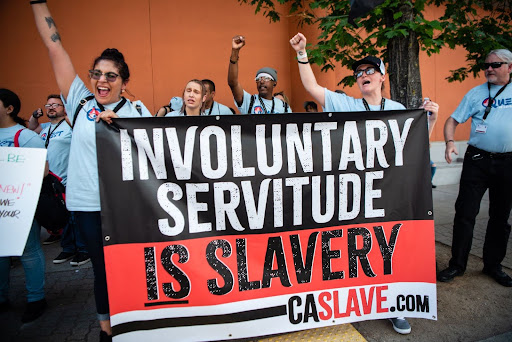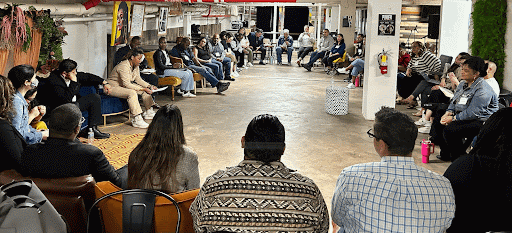Black Women for Wellness: A Case for Supporting Black-led Reproductive Justice
Popping up near bus stops, train stations, and other strategically placed locations within a driver’s line of vision are giant billboards in crisp black and white, proclaiming: Abortion is and will remain legal in California. Overlaid on the message in a puffy, golden font reads a closing reassurance: We got you!
The organizing and creation of this public awareness campaign are a direct reflection of the strength, wisdom, and brilliance embodied in the leadership and lived experience of Black women. Launched by Black Women for Wellness and the National Black Women’s Reproductive Justice Agenda, these billboards across California set the record straight and offer much-needed encouragement today. As in so many other circumstances, Black women and gender-expansive organizers shine their light, offer their vision, and show us all a way forward. They also provide a path for philanthropy to follow at this moment.
Getting Philanthropy to We Got You
It’s long past time for philanthropy to take a “we got you” stance regarding Black women’s leadership on reproductive justice.
To set the context, a meager 1.9% of all philanthropic dollars go to women and girls. Moreover, only a fraction of that goes to reproductive justice, with a tinier slice of that going to Black-led organizations. And yet, Black-led organizations are at the forefront of California’s push to become a reproductive freedom state. Despite chronic underfunding, organizations like the LA-based Black Women for Wellness are making a way out of no way. Their leadership and vision demonstrate how and why it’s possible for the proclamations of the billboards to ring true.
"Black women are at the forefront of the intersectional reproductive justice movement and helm its thought leadership, moving our state forward on issues that matter to everyone. Listening to and taking the lead from Black women, femmes, girls, and gender-expansive folks is vital to how California fortifies itself as a bastion of reproductive justice organizing."
Over five years ago, Black Women for Wellness co-sponsored a groundbreaking bill that mandated companies to inform the public of what’s in the products we put on our bodies every day. Two years ago, they were behind a bill that required implicit bias training for healthcare providers to address disparities in Black maternal health. And just last year, they pushed the Momnibus bill to the finish line, which re-imagines maternal health for birthing people and new parents. Black Women for Wellness has a multigenerational lineage of organizing that has shaped California’s policy landscape on issues ranging from making doulas available to birthing folks to rolling back eugenics-based Welfare policies. Black women are at the forefront of the intersectional reproductive justice movement and helm its thought leadership, moving our state forward on issues that matter to everyone.
Listening to and taking the lead from Black women, femmes, girls, and gender-expansive folks is vital to how California fortifies itself as a bastion of reproductive justice organizing. But that trailblazing has not translated into dollars in the field. Even without the material resources, Black women create solutions to better their environment and communities, practice effective leadership, and foster a sense of safety and belonging.
While there is more cultural recognition that Black women have always been central to the struggle for freedom and equality, it’s time to turn that recognition into real dollars.
Beyond Abortion: An Intersectional Approach
As writer, radical feminist, and visionary Audre Lorde reminds us: “There is no such thing as a single issue struggle because we do not live single-issue lives.” Black Women for Wellness has baked that political approach into their work and California’s reproductive justice movement writ large.
Black Women for Wellness does not have a myopic focus on abortion, which strengthens their organizing power. The organization looks at the big picture and connects the dots. They are making it clear to folks that an attack on abortion access is inextricably linked to other crucial questions: Who gets to have a say in who you love? How do your gender and expression impact the kind of care you receive at the hospital? What happens when you’re stopped for a traffic violation? When you get ready to cast your ballot?
Building the Field of (c)4 Funders
Policy advocacy is a highly impactful way to advance equity and justice, and philanthropy can play an essential role in that process. It’s high time for the sector to grow its advocacy role and allow the resources to flow.
Like many power-building organizations, Black Women for Wellness has a 501(c)4 arm — the first in the country focusing on Black women’s Reproductive Justice. Philanthropic c4 grantmaking is often insufficient as it moves too late and only in election years. If funders want to sustain long-term organizing work around abortion access, they must fund all the other non-partisan elements of 501(c)4 organizations. Some examples include providing funding to hire more staff, participating in learning opportunities with peers, combating voting suppression, advancing key legislation, and furthering their community reach. Foundation grants to 501(c)4 groups have the potential to free up organizations’ capacity to use their unrestricted funds for more advocacy work (like critical work around this November’s Proposition 1). It isn’t about political parties — it’s about making the political process more accessible.
Women’s Foundation California’s Funders Policy Institute (FPI) is one way to nurture that growth. An immersive learning program, FPI is focused on supporting donors and philanthropists to become more strategic in their policy advocacy grantmaking. The weeklong training takes an intersectional feminist approach to policy advocacy and power-building for racial, economic, and gender justice in California. For those interested in growing their policy chops and connecting with aligned funders, registration is now open to join this year’s FPI class.
Many Pathways to Liberation
"It’s time for philanthropy to take a “we got you” stance regarding moving money and prioritize a trust-based approach. We have a role in strengthening California’s infrastructure as a reproductive freedom state for all, ensuring affordable access to all reproductive health care options."
Black Women for Wellness is a Black-led reproductive justice organization working swiftly and diligently to protect the political, economic, and fundamental rights of Black women and girls. There are many ways to support them and organizations like them, regardless of whether or not you are a reproductive justice funder.
There are so many avenues to enter this work. Through the rich and complex lives of Black women, the nonprofit has trained Black women and girls in California to influence public policy, organize, and build power. Building on a COVID-19 recovery? We got you! Providing real deal comprehensive sex education? We got you! Making sure your shampoo doesn’t give you cancer? We got you! Bringing in voter education and civic engagement? We got you!
Our Work for Wellness
Black Women for Wellness is doing what needs to be done and doing it well. They have taken an approach that blends culture shift with liberatory policy change and direct electoral work. They elevate the critical challenges that Black women face and build real political and community power. Imagine what might be possible if we funded them at the scale their work deserves.
Now, we — the philanthropic sector of California — have work to do. It’s time for philanthropy to take a “we got you” stance regarding moving money and prioritize a trust-based approach. We have a role in strengthening California’s infrastructure as a reproductive freedom state for all, ensuring affordable access to all reproductive health care options. The power and potential of organizations like Black Women for Wellness deserve nothing less than multi-year, unrestricted funding and a lot of it to keep this work moving forward now and for generations to come. And that funding needs to be easy to access with simplified grant applications and reporting processes. Do you genuinely have someone’s back if you make them fill out endless short-paragraph essays in an outdated grant portal?
There is too much at stake and substantial evidence that clearly shows what’s possible when organizations led by Black women and gender-expansive folks get the funding and trust they deserve. Black women and gender-expansive folks deliver. It’s time for philanthropy to do the same.
Below, you’ll find three ways you can take action today to support organizations, networks, and infrastructure building bodily autonomy in California and beyond.
1. Give Now Donate to Women’s Foundation California or directly to any (or all!) of the phenomenal BIPOC-led reproductive justice organizations.
2. Give for the Long Haul The philanthropic reality is most BIPOC-led organizations like those that are part of our grant partner community are not funded over the long haul. Join us in supporting movement leaders with multi-year general operating support.
3. Join the Funders Policy Institute If you are a grantmaker, funder, or philanthropic advisor looking to learn more about how to fund the organizations and policy advocacy that are paving the pathway to liberation, come to the Funders Policy Institute, November 14-18.



